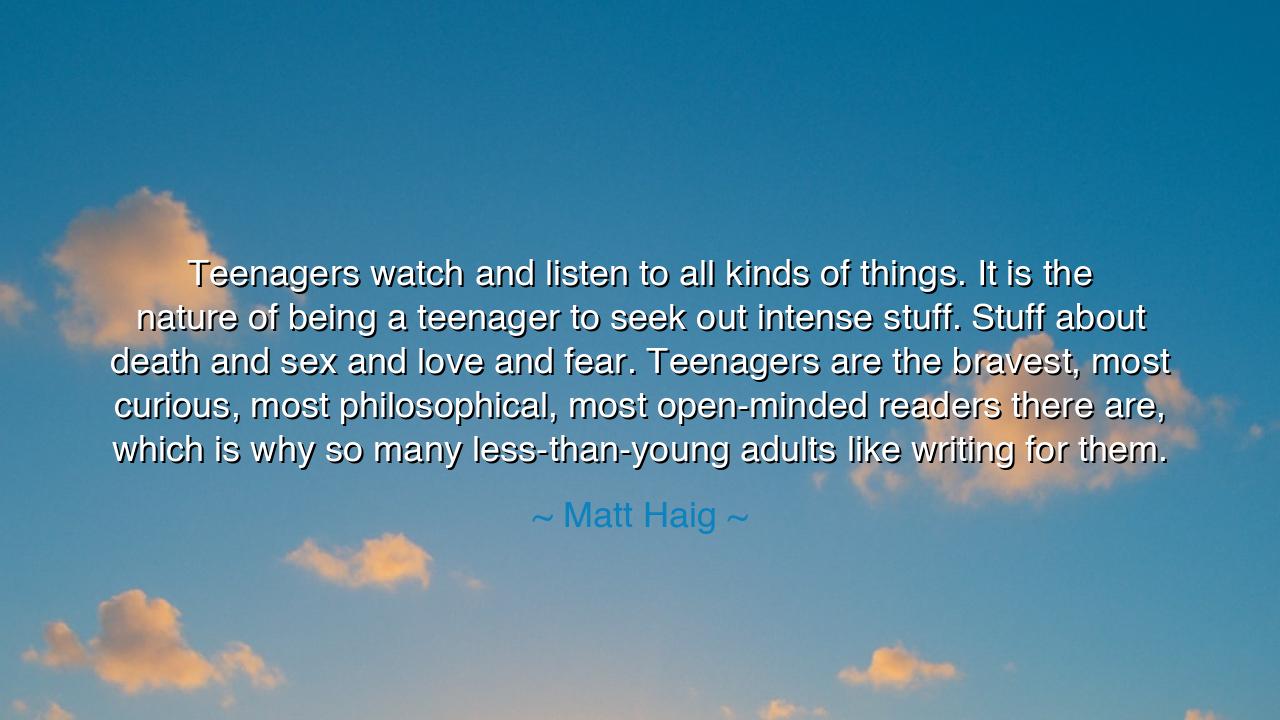
Teenagers watch and listen to all kinds of things. It is the
Teenagers watch and listen to all kinds of things. It is the nature of being a teenager to seek out intense stuff. Stuff about death and sex and love and fear. Teenagers are the bravest, most curious, most philosophical, most open-minded readers there are, which is why so many less-than-young adults like writing for them.






“Teenagers watch and listen to all kinds of things. It is the nature of being a teenager to seek out intense stuff. Stuff about death and sex and love and fear. Teenagers are the bravest, most curious, most philosophical, most open-minded readers there are, which is why so many less-than-young adults like writing for them.” Thus spoke Matt Haig, a writer whose heart beats in rhythm with the young, and who remembers the fierce hunger of youth — that sacred restlessness that drives the spirit to search for meaning in the shadows of the world. His words are not merely praise, but a revelation of what it means to be young and alive, standing at the edge between innocence and experience, between wonder and despair.
In every age, the youth are seekers. They chase truth not in half-measures, but with fire and trembling. When Haig says that teenagers seek out intense stuff, he speaks of a longing ancient as humanity itself — the yearning to touch the pulse of existence, to look upon the mysteries of death, love, and fear, and to ask, “What am I?” This is not recklessness, but courage: the willingness to face what older hearts may avoid. The young are philosophers without titles, poets without fame — and it is their unbroken hope, their raw honesty, that makes them the purest readers of the human soul.
In the old tales, this sacred curiosity was called initiation. The youth of every tribe, upon reaching the threshold of adulthood, were sent into the wilderness — to face beasts, storms, or silence. It was not cruelty, but wisdom, for the elders knew that the young must confront the mysteries of life and death to awaken their spirit. So too in our time, the young go forth — not into forests, but into the worlds of stories, of music, of film. They seek out tales of love and loss, of terror and tenderness, because instinct tells them that truth hides there, wrapped in beauty and pain.
Consider the story of Mary Shelley, who, as a young woman barely nineteen, wrote Frankenstein. Out of her own grief and fear of death, she created a story that questioned the limits of creation and the responsibility of humankind. Her youth did not make her naïve — it made her brave enough to ask questions that older minds dared not face. Like the youth of every generation, she gazed into the abyss and wrote what she saw, giving voice to the questions that haunt all ages. Thus do the young serve as the conscience of the world — for where adults grow cautious, they remain daring; where the weary grow cynical, they remain curious.
Haig reminds us that teenagers are not lost — they are learning to find themselves. They wrestle with chaos because they sense that meaning hides within it. And those who write for them — the “less-than-young adults” — are drawn to that fire, for it reminds them of their own first awakenings. In writing for the young, the old drink again from the spring of wonder. They remember the days when every word felt sacred, when every idea was a spark that could set the soul ablaze. Thus, the relationship between the young and the old is not a divide, but a circle — one seeking truth, the other remembering it.
To mock or fear the curiosity of youth is to silence the dawn. For it is in youth that the soul tests its wings, dares to imagine, and begins the lifelong pilgrimage toward wisdom. The young read not to escape, but to understand. They listen to the songs of sorrow and ecstasy because they wish to feel the full weight of being alive. Their openness is a sacred thing — not weakness, but power. It is the courage to remain unguarded in a world that teaches armor.
Lesson: Honor the boldness of the young. Do not seek to shield them from truth, but guide them through it. Read with them, speak with them, listen to them — for they carry within their questions the seeds of the future. And if you yourself have grown older, do not let the fire die. Return to the pages that once woke your heart. Seek again the intense stuff — the beauty, the terror, the wonder — that made you human. For in doing so, you will find that youth is not a number, but a spirit; and that the bravest readers, like the truest souls, are those who never stop asking.






AAdministratorAdministrator
Welcome, honored guests. Please leave a comment, we will respond soon